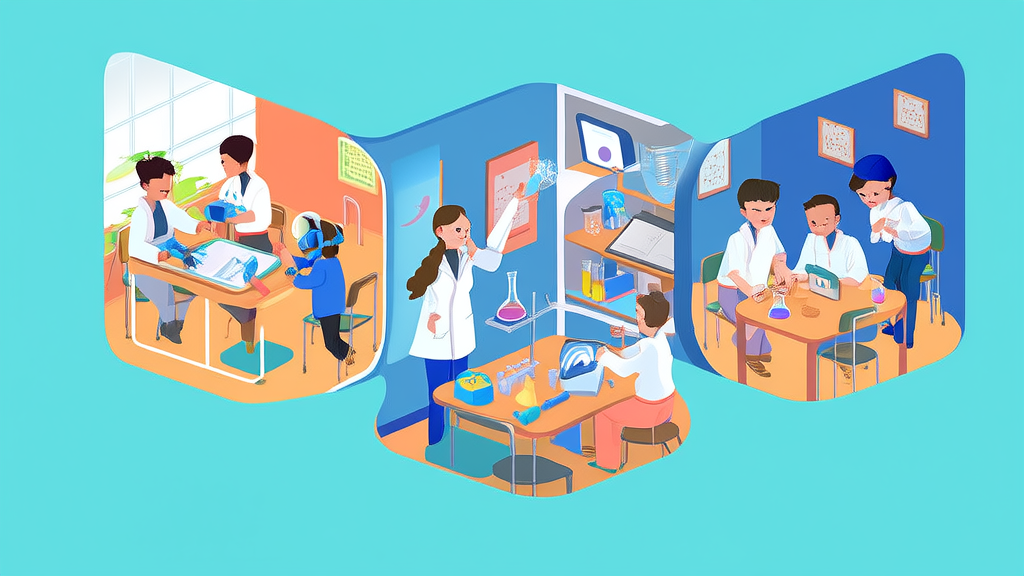Unleash Potential: 3 Transformative K-12 Innovations for 2025

Transforming K-12 Education: Innovations, Insights, and Inspiration for 2025
Welcome to the future of education! As we navigate through July 2025, it's an exciting time for K-12 education, marked by groundbreaking methodologies, insightful research into child development, and the integration of cutting-edge technology. This post aims to provide valuable insights and practical advice for both parents and educators, ensuring our children receive the best possible educational experience.
The Power of Project-Based Learning (PBL)
Project-Based Learning (PBL) has emerged as a highly effective teaching methodology, fostering critical thinking, collaboration, and problem-solving skills among students. Unlike traditional rote learning, PBL engages students in real-world projects that require them to apply their knowledge in meaningful ways. For example, a science class might work on a project to design and build a sustainable garden, integrating concepts from biology, chemistry, and environmental science.
Actionable Advice: Teachers can start small by incorporating mini-projects into their curriculum. Parents can encourage their children to explore interests through hands-on projects at home, such as building a model or conducting a simple experiment.
Understanding Child Development: The Science Behind the Smiles
Recent research in child development has shed light on the importance of social-emotional learning (SEL) and its impact on academic success. SEL focuses on helping students develop self-awareness, self-management, social awareness, relationship skills, and responsible decision-making. Studies have shown that students who participate in SEL programs show improved academic performance, better behavior, and stronger relationships with peers and adults.
Example: A school in California implemented a comprehensive SEL program, which included regular mindfulness exercises, peer mediation, and community-building activities. Over two years, the school saw a 30% reduction in disciplinary incidents and a 20% increase in student engagement.
Actionable Advice: Teachers can integrate SEL into daily routines by starting each day with a brief mindfulness exercise or by using "feeling check-ins" during class. Parents can support SEL at home by encouraging open communication, practicing empathy, and modeling healthy conflict resolution.
Educational Technology: Tools for Tomorrow's Learners
Technology continues to play a pivotal role in K-12 education, offering innovative tools that enhance learning experiences. Adaptive learning platforms, virtual reality (VR), and artificial intelligence (AI) are just a few of the technologies making waves in the classroom. Adaptive learning platforms, such as DreamBox and Khan Academy, use AI to personalize learning paths for each student, ensuring they receive the right level of challenge and support. VR, on the other hand, allows students to explore historical sites, conduct virtual experiments, and even travel to outer space, all from the comfort of their classroom.
Success Story: A middle school in Texas integrated VR into their history curriculum, allowing students to virtually visit ancient civilizations. This immersive experience not only increased student engagement but also led to a 25% improvement in test scores related to historical events.
Actionable Advice: Teachers can explore free and low-cost educational technology tools to enhance their lessons. Parents can support their children's learning by providing access to educational apps and websites, and by engaging in discussions about what they are learning online.
Practical Tips for Parents and Teachers
Both parents and teachers play crucial roles in shaping a child's educational journey. Here are some practical tips to help you support and inspire your students:
- Communicate Regularly: Maintain open lines of communication between home and school. Regular updates and feedback can help address any challenges early on.
- Encourage Curiosity: Foster a love for learning by encouraging questions and exploration. Provide opportunities for students to pursue their interests and passions.
- Set Clear Expectations: Clearly communicate expectations for behavior and academic performance. Consistency is key in creating a structured and supportive environment.
- Celebrate Achievements: Recognize and celebrate both big and small achievements. Positive reinforcement can boost confidence and motivation.
Conclusion: Join the Journey of Transformation
As we continue to evolve in the world of K-12 education, it's essential to stay informed and adaptable. By embracing new teaching methodologies, understanding the latest in child development, leveraging educational technology, and implementing practical tips, we can create a more engaging and effective learning environment for our children. Let's join hands and embark on this transformative journey together, ensuring that every child has the opportunity to thrive and succeed.
For more resources and to stay updated on the latest in K-12 education, follow our blog and connect with us on social media. Together, we can make a difference!